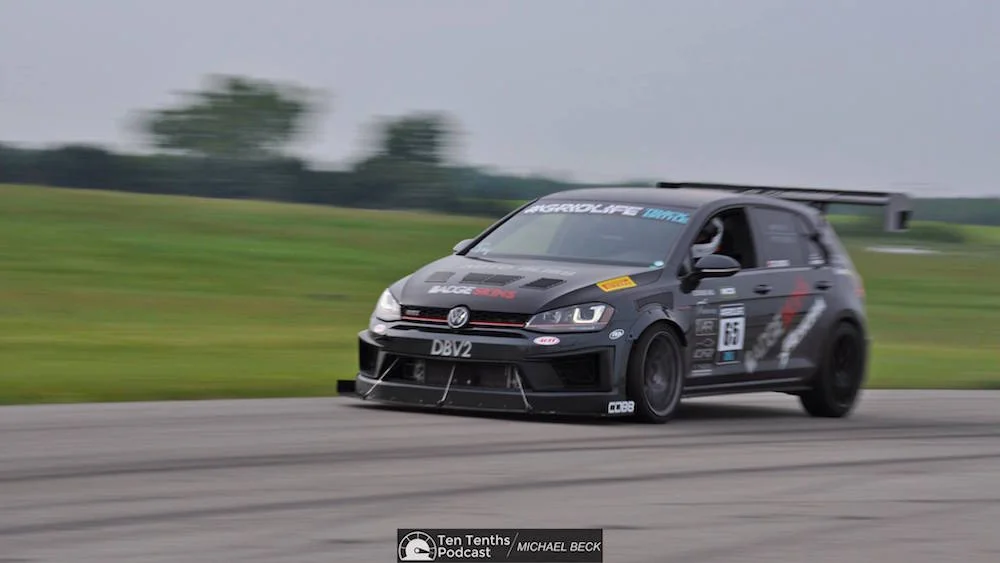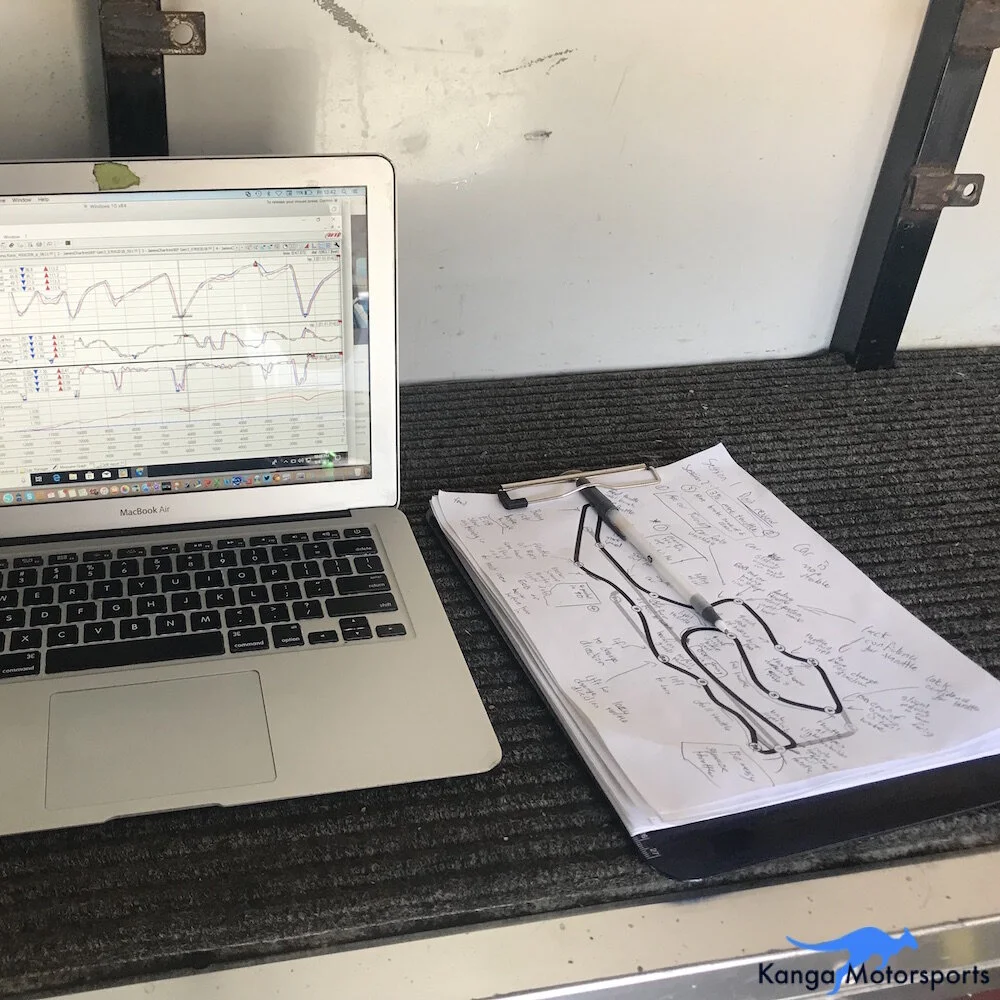Written by James Chartres & Ryan Dunham
1. Autocross
One of the cheapest and easiest ways to get started in motorsports. You can take your own street car racing. Course are set up around larger paved areas or parking lots. You then race against the clock as you try to set the fast time possible (without knocking over cones).
Autocross is a great way to get started as you don’t need a lot of safety gear or even to spend lots of money on your car. A car in good condition, a helmet and you are ready to race.
Events are very safe as only 1 car is on the course at a time and track layouts are designed to avoid obstacles and anything you could hit. You may only get a few runs in a day but that minute or less will get the adrenaline pumping. Check your local area for Autocross (sometimes called Solo) events.
Cost: ~$50 per event.
Ahren Renner - Nissan 350Z courtesy of SCCA San Francisco Region Autocross - www.sfrautox.com
2. Rallycross
Similar to Autocross, Rallycross is one of the cheapest ways to get started in motorsports. Courses are set up in a field or a dirt lot, and you race through the course, fastest cumulative set of timed runs wins.
Similar safety and preparation requirements to Autocross, a car in good condition, a helmet, and you’re good to go. Be aware there may be more wear and tear on the car because of dirt, stones, and ruts on the course as compared to autocross.
Events are very similar, comparable in operation to an Autocross event, with only 1 or 2 cars on course at a given time. As much or more exhilarating as autocross, because you end up sideways most of the time! Check with the SCCA in your local area for sanctioned Rallycross events.
Cost: ~$50 per event.
Photo courtesy of Adam Xia.
3. Track Days
Another great way to get into motorsports using your own car. Here you can take your car around famous road racing tracks in your areas as you learn the skills to drive fast laps.
Again all you need is a well maintained street car and a helmet to get started. Most organizers even have beginner groups that will provide instructors to help you get up to speed safely.
These events are all day providing up to 2 hours of track time. The increased track time over autocross will likely see you using up tires and brakes (rotors and pads) quicker. A quick search and you will probably find a few track day organizations in your area.
Cost: ~$200-300 per event.
4. Go-Karts
Many famous race car drivers got their start go-karting. You can just rent at you local indoor/outdoor go-kart place or get more serious and buy your own kart to race around at various tracks. For the budget conscious you might look into the Briggs 206 class which is incredibly popular using a standard motor to keep cost down. There are also very fast high end karts such as shifter karts, more expensive but they will really throw you back in the seat as you squeeze the throttle.
Go-karts require a little more equipment and safety gear. Karts are easy to lug around and can fit in the back of many trucks, SUV and even wagons. If you are renting you might be able to get all your gear at the rental facility. Otherwise you will need race gear (Helmet, Suit, Gloves, Shoes), the Go-kart, any spares and tools.
Costs: $100s to $1000s per event.
Jack Reihl of RacersHQ - Photo Courtesy of Chip Reihl.
5. Time Trials / Time Attack
Is a growing area of Motorsports. It allows you to race against the clock much like autocross except you are on a road racing course and the cars are spaced out on track. The rules are often very open depending on the class allowing people to modify and build their track cars up for competition from mild street builds to wild track only dedicated cars. Check your local area for the events and sanctioning body closet to you.
Costs: $100s to $1000s per event.
6. Drifting
A very popular form of motorsports focusing on car control and adding style to driving through connected corners. Similar to track days there is minimal safety equipment when starting out and beginner groups can get instructors to help them learn the skills and techniques. Drifting competitions are judged based on line, angle, speed, style and show factor. Often drivers will develop their own style of power oversteer getting the car sideways and smoking tires. Drifting events can be held on large paved parking lots (like autocross) and road courses (like track days).
Costs: ~$200-$500 per event.
Michael Beck of Ten Tenths Podcast drifting his Fiat 124 Sport Spider.
7. Road Racing
There are many different ways of going road racing including budget endurance (24 hours of Lemons, LuckyDog, World Racing League, etc), club racing (SCCA, NASA, PCA, BMWCCA, etc) or even professional (World Challenge, IMSA, Touring Cars). All with vastly different costs. The most common for the amateur racer is budget endurance or club racing. Then there is a large variety of cars to choose from production cars, sports racers, formula cars and even prototypes. With so much variety you really can pick and choose what you want to race and which organization you want to race with.
Racing a car often requires much more equipment for hauling, maintaining and operating the race car. Most likely you will need a tow vehicle and some sort of trailer to get the race car, safety gear, equipment, tools and spares to the track. If you are not ready to make that commitment yet there are many places and companies where you can just rent a racecar to drive and they will take car of the rest. The other great thing about renting is you can try out different kinds of race cars before you decide and then go buy what suits you.
Much like street cars, the more exotic and extravagant the car the greater the purchase and operating costs. It is possible to do it on a budget and there are many affordable options such as Spec Miata, Spec Racer Ford and smaller displacement production cars. For more specifics on costs check out our detailed breakdown here. Check out your local racing groups and clubs to find out more about what events are happening in your area.
Cost: ~$1000s to $10,000s per event.
8. Rally
Stage Rally, or ‘Performance Rally’ is a large step up from Rallycross in both car prep and cost (full cage required, robust suspension recommended). Rally is point to point racing on closed sections of public roads (usually gravel roads like logging roads), and happens on gravel, tarmac, ice, snow, mud, and dirt, sometimes all in the same event!
Expect to spend at least $8,000 to convert an existing car (does not include purchase cost) and add the minimum of required safety gear, including: an 8 point Roll cage, racing seats, racing harnesses, fire extinguishers, spill kit, triangles, spare tire mounts, and incidentals. New drivers are usually cautioned to purchase an existing, complete car, rather than starting by building their own car. 2wd cars (FWD and RWD) are much cheaper to purchase, prepare, and maintain than AWD cars.
Required safety equipment is similar to road racing: a helmet (though open face is ok), firesuit, and head and neck restraint are required. Certified (SFI/FIA) shoes and driving gloves are recommended but not required.
Things one can do if they’re interested:
Volunteer for events - closer to the action, learn the structure of the events, ask questions of competitors. It takes hundreds of Volunteers to effectively run a Rally event
Start as a Co-Driver - be in the rally car, lower cost of entry, learn driving do’s and don’ts
Go to a Rally school - about the cost of one event, will progress as a driver much faster
Take advantage of test days and RallySprint events - Get seat time at a lower time commitment and cost.
Cost: ~$1000s to $10,000s per event.
Photo Courtesy of Ryan Dunham - @rallysideways





















Want to be faster at the track? We share our tips and tricks on reviewing your videos and improving your lap times.